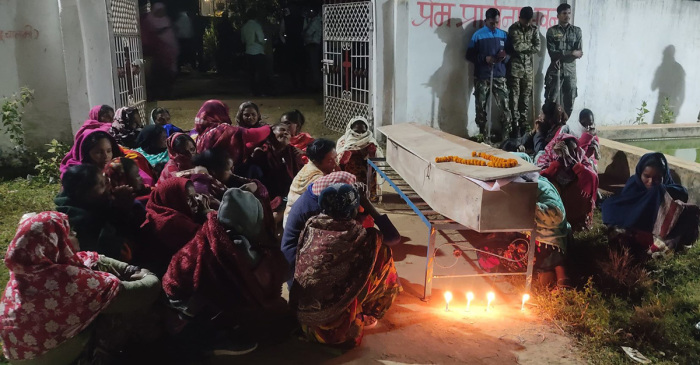
Two Christian families in India’s Chhattisgarh state were denied the right to bury deceased relatives in their native villages. In both incidents, locals blocked access to burial plots and insisted on Hindu rites as a condition for entry, forcing the families to travel elsewhere to perform final rites.
In the first case, a man from the Kodekurse area in Kanker district died on Nov. 5 after a long illness. The man’s family attempted to bury him in their ancestral land within the village but were blocked by other residents who objected to the family’s Christian faith, the U.K.-based group Christian Solidarity Worldwide reported.
Attempts to resolve the issue through police intervention failed. The officers reportedly declined to confront the villagers, leaving the family unable to proceed with the burial. With threats escalating, the Christian community placed the body in front of the local police station in protest.
On Nov. 6, other Christians from nearby villages arrived to support the family, but authorities still refused to act. Officials instead advised them to find another location to bury the body.
The family feared violence on the road from local Hindu nationalist groups and requested a police escort as they moved the body to Charama, a neighboring town. On Nov. 7, the funeral procession was followed by an aggressive crowd for nearly a kilometer before it dispersed. The convoy was then diverted nearly 200 kilometers to the state capital, Raipur, where the body was finally buried in a Christian cemetery.
In a second incident days later, residents of Jewartala village, roughly 90 kilometers from Raipur, stopped the burial of another Christian convert.
Raman Sahu, a Jewartala resident who had embraced Christianity in recent years, died at a private hospital in Raipur and was brought back to his native village for burial, The New Indian Express reported.
Sahu’s family was blocked at the village entrance by locals who demanded that the funeral take place according to traditional Hindu customs. Villagers reportedly set the condition that burial would be allowed only if the rites followed local religious norms.
Police were dispatched to the village to maintain order as tensions escalated. The district administration tried to mediate but could not convince the villagers to allow the burial.
In the meantime, Sahu’s body was kept in a mortuary while negotiations continued.
Eventually, the family was forced to conduct the burial at Sankra burial ground, away from Jewartala, on the following Sunday. Balod district police chief Yogesh Patel told the media that the villagers had denied the family a burial site on account of their religious conversion.
Police officials told the newspaper that in both the Jewartala and Kodekurse cases, villagers justified their actions solely on the grounds that the deceased had converted to Christianity. The families had attempted to use land that legally belonged to them or was earmarked for burial, but the communities refused access unless they agreed to renounce their faith.
The Chhattisgarh Christian Forum criticized authorities for failing to uphold constitutional rights.
The Forum’s president, Arun Pannalal, said Christians were being systematically denied the dignity of burial in their own villages while local officials stood by. He added that the areas in question had already been designated for burial use under the law.
Christians in India often face hostility rooted in allegations of religious conversion, especially in tribal and rural regions where Hindu nationalist groups accuse them of spreading foreign faiths. The suspicion fuels social boycotts, physical intimidation and denial of basic rights.
India ranks as the 11th-worst country in the world for Christian persecution, according to the Open Doors World Watch List. The watchdog group notes that at least a dozen states have passed anti-conversion laws that threaten the religious freedom of Christians.